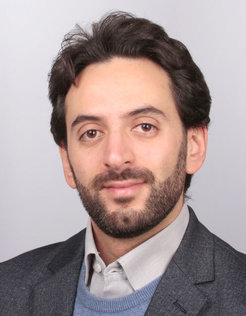Raffaello Potestio has been awarded an ERC Starting Grant for the project VARIAMOLS
The European Research Council supports the project "Variable resolution algorithms for macromolecular simulations – VARIAMOLS” by Dr. Raffaello Potestio with an ERC Starting Grant of 1.4 million euros. The group leader at the Max Planck Institute for Polymer Research (MPI-P) will develop and apply novel techniques to represent a large biomolecule, such as a protein or an assembly of several proteins, with models that are at the same time chemically accurate and computationally efficient. The project will be carried out at the Physics Department of the University of Trento, Italy, and is scheduled to start on January 1, 2018.
Large biomolecules such as proteins and protein assemblies feature the unique characteristic of performing function: they can catalyze chemical reactions, transport atoms and molecules across the cellular membrane, bind to foreign bodies to be destroyed, or combine into large molecular machines that perform a variety of different tasks.
Comprehending how such large assemblies work is not only crucial per se for the basic understanding of functionality, but also a unique source of inspiration for the design of tailored artificial molecular devices for different fields such as medicine and chemistry.

One of the most prominent problems in the computational study of these macromolecules is that the computational effort for using accurate atomistic models dramatically increases with system size. Simplified, coarse-grained representations offer an elegant and effective alternative to high-resolution models, and enable the simulation of large systems; but they have the disadvantage of lacking chemical accuracy, which results in the fact that the realistic reproduction of properties of interest is only possible to a limited extent. So far, multi-scale methods have been developed to address this challenge, but the key problem of accurately and efficiently modeling a complex macromolecule of hundreds of thousands of atoms has not yet been solved.
The VARIAMOLS project aims to overcome this gap by developing novel computer-based methods. This should be achieved by a bottom-up modeling strategy in which the system itself determines which parts can be simplified and to what extent this is possible. In contrast to the current multi-scale methods, the resolution of the macromolecule varies smoothly through the structure, being more or less detailed depending on local features. This optimizes the balance between detail and efficiency. "This method provides a deeper insight into how key biological macromolecules carry out their function by means of concerted movements. On the long term, the outcome of my work will help to improve the development of antiviral and antibody-based drugs," Raffaello Potestio explains.
Since 2013, Raffaello Potestio has been working as a project leader at the MPI for Polymer Research in Mainz in Prof. Dr. Kurt Kremer’s "Polymer Theory” Department. His focus is to develop and apply computational methods that allow efficient investigation of soft matter in general, and biological systems in particular. Special attention is payed to the underlying mechanical and thermodynamical properties of these systems. The ERC Starting Grant is the next important step in his scientific career. At the University of Trento the junior scientist will lead his first independent group. "We are very pleased about Raffaello Potestio's award and that he has developed the scientific fundamentals for his project during his research at the MPI-P," says Prof. Kurt Kremer. “We want to remain closely linked through cooperation in the future."
About Raffaello Potestio

Raffaello Potestio graduated in Physics from the University of Rome "La Sapienza" in 2006, with a Master Thesis on Lattice Quantum Chromodynamics under the supervision of G. Martinelli. In the same year he enrolled in a PhD course in Statistical Physics at the International School for Advanced Studies (SISSA-ISAS) in Trieste. In 2010 he defended his PhD Thesis on coarse-grained models of protein structure and interactions, supervised by C. Micheletti. In November 2010 he joined K. Kremer's group at the MPI-P as a postdoc. In August 2013 he became Project Leader of the “Statistical Mechanics of BioMolecules” group.













